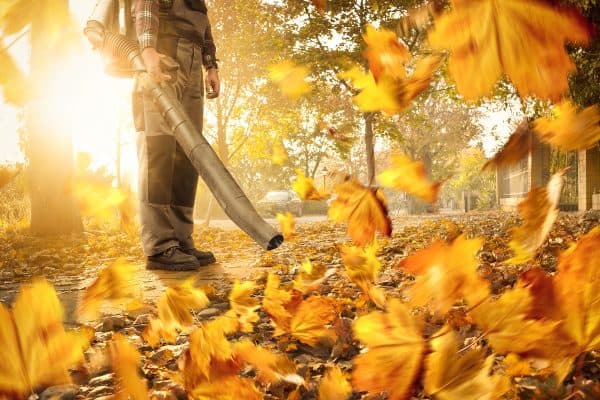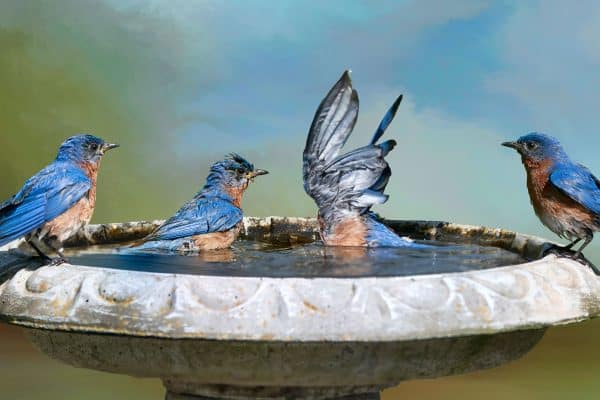Artificial grass is an alternative material to have on your front lawn instead live grass. You might wonder whether a patio cleaner can damage your artificial grass. So, we've researched this question for you to ensure your lawn and hardscape areas look pristine.
Avoid using aggressive cleaning products or chemicals because they can bleach or otherwise harm your artificial grass. Using patio cleaners on artificial grass is also unnecessary since there are other ways you can keep it clean without exposure to harsh chemicals.
Artificial grass can last as long as 15 years if properly maintained. One of its core advantages is that it requires little maintenance. Keep reading to learn more about artificial grasses and the proper ways to keep them looking great.
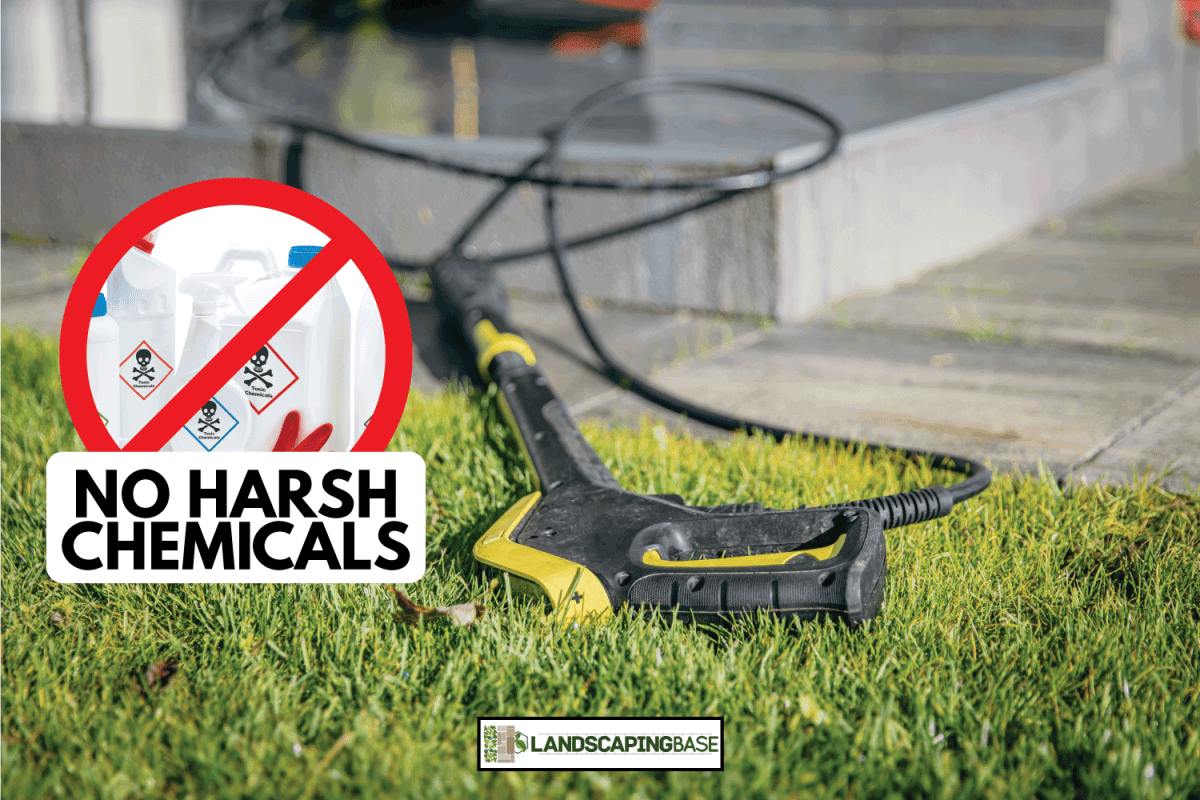
Does Patio Cleaner Damage Artificial Grass?
If you clean your artificial grass with improper tools and substances, you risk aesthetic damage, functional damage to the drainage system, or maybe both.
To get rid of sticky substances and dirt from your artificial grass, avoid using harsh chemicals that could harm the plastics used in making them. Use dishwashing liquid, a mixture of vinegar and water, or a synthetic grass cleaner instead.
Check out this Nature's Pure odor eliminator on Amazon.
Importance of Cleaning Your Patio
Patio surfaces are exposed to debris, pollutants, and weather. You lose more than just curb appeal if you don't clean them. Additionally, grass and weeds can grow in joints, which might eventually harm them. Here are the reasons you should take care of your patio and artificial grass.
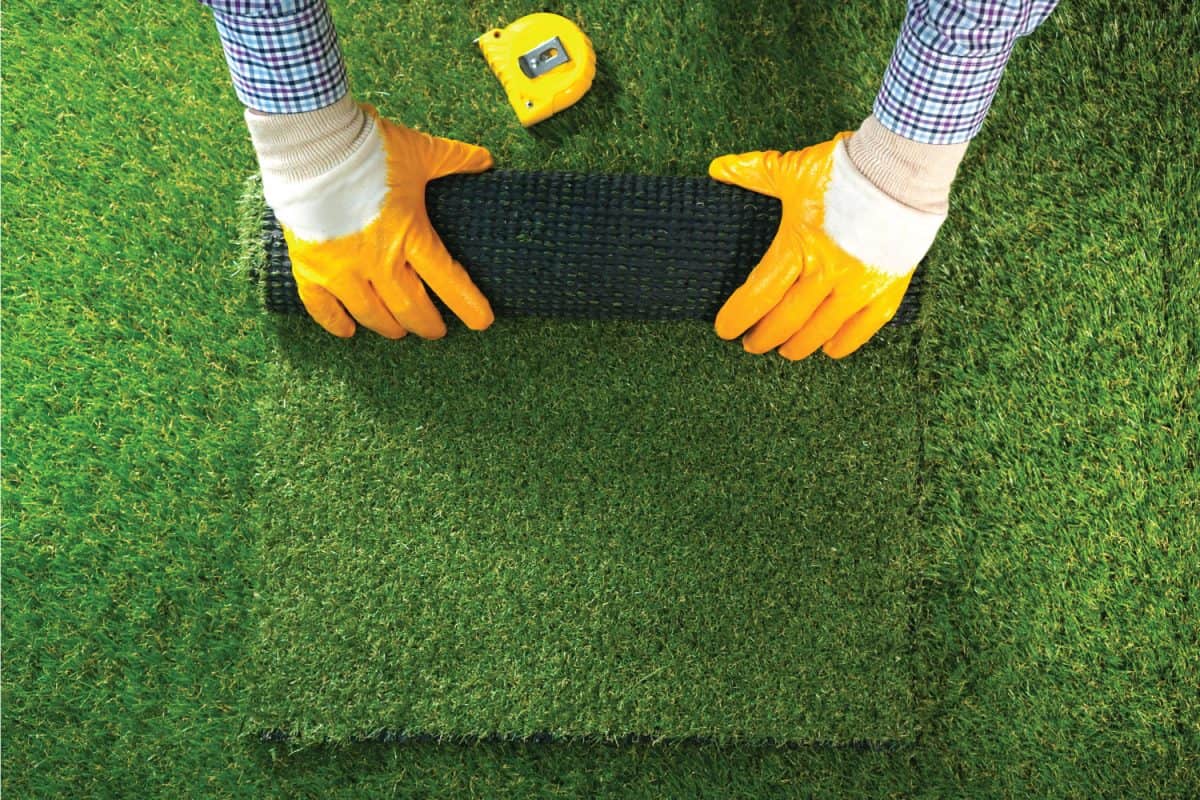
Aesthetic Appeal and Property Value
Your surroundings have a direct impact on your mood. Being surrounded by unsightly, dirty patio surfaces makes it much harder to unwind when spending time outside.
It is crucial to bear in mind if you ever intend to sell your house, maintaining its curb appeal will increase its value to potential buyers. This involves routinely setting up patio cleaning services.
For Safety Purposes
A dense covering of moss or algae on the stone's surface can make patios highly slippery, especially in damp weather. This needs to be addressed immediately because over time it turns into a significant hazard surrounding your home.
All of the moss and algae can be eliminated by steam cleaning, which also increases the patio's traction, making it safer for everyone.
How Do I Clean My Artificial Grass?
There are a few simple things to think about when maintaining fake grass that can keep your lawn looking neat.
Checking your artificial grass frequently ensures that the accumulation of leaves, twigs, dust, or dirt doesn't start to decompose or promote moss growth, all of which are bad for your lawn. The following simple measures are the best method to maintain artificial grass:
Brush The Grass
Brush the grass with a plastic rake or a broom. Using a metal rake can harm your lawn.
Get a plastic rake head with an adjustable handle on Amazon.
To make the grass look neater, if something heavy has left traces in it, you might have to brush against the grain. Start in the far corner of your garden, work your way around one side, and then take on the entire grass in strips as you would if you were mowing it.
Remove The Leaves
To get rid of the leaves and trash, use a leaf blower. You can use a dustpan and brush to gather the debris by hand or by blowing it all toward one corner to make it easier to collect it all at once. Regularly carry out operations to aid in preventing weed growth in the turf.
Get this Black&Decker electric leaf blower on Amazon.
Take Out Weeds
Use a water-based moss and weed killer with a pH balance that is no higher than 8. Be careful to get rid of loose leaves as you remove dead weeds, moss, or other debris. To remove different stains from grass, you need water, detergent, a paper towel, and a sponge or a soft cloth.
Clean Spilled Liquid Immediately
Whatever precautions you take, spills and stains will drop on your grass whether it's from a drink that has been spilled or mustard from a barbecued hotdog. Here is how you can effectively deal with them.
Take a paper towel, and dab it—not rub—into the grass. If you want to be certain that the spill has been eliminated, give it one last rinse with water.
A teaspoon of detergent and a pint of water should be combined in a bucket. Bring the bucket to the stain, then massage it with a sponge or soft cloth to remove it. The detergent should then be rinsed out using a water hose.
For difficult pet stains, mix a teaspoon of dishwashing liquid into a gallon of lukewarm water. To remove the stain, immediately rinse the area that is affected. After that, rinse the area with a water hose to get rid of any lingering odors and detergent.
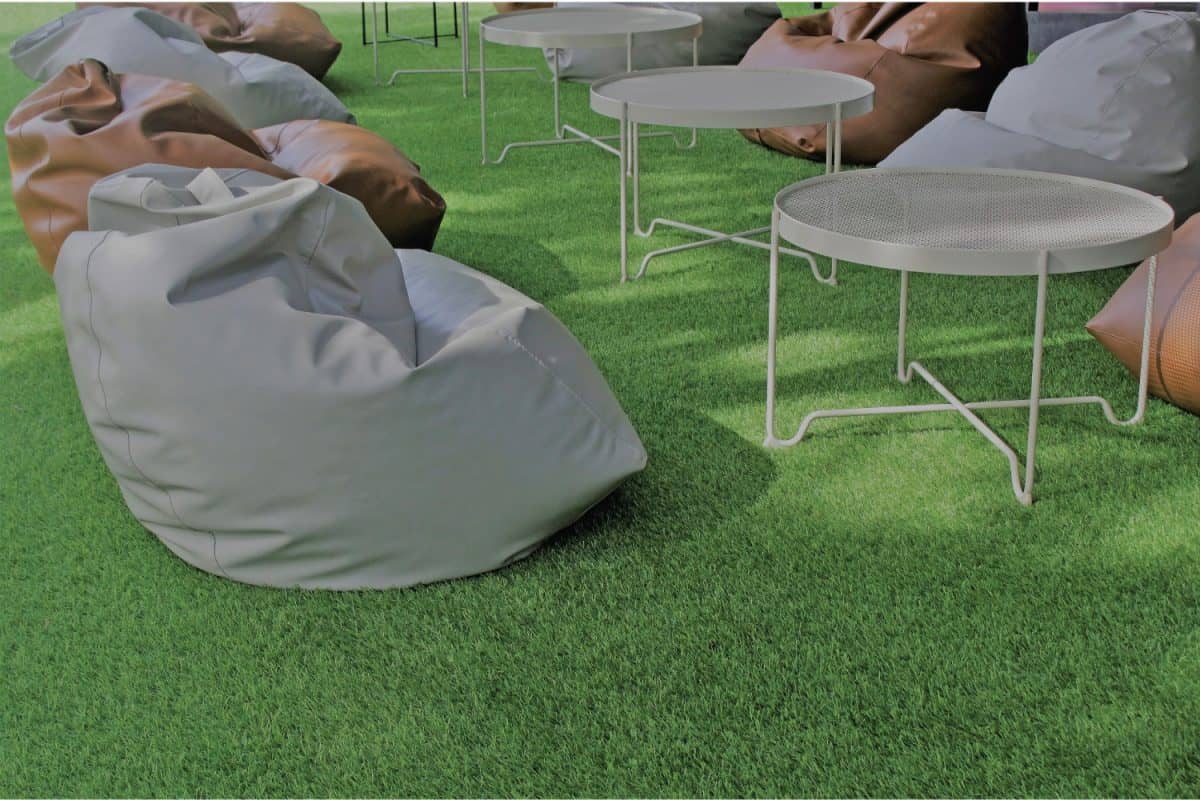
What Will Damage Artificial Grass?
Although artificial grass looks great, there are ways in which it can be harmed. Here are some things that can damage artificial grass.
Fire
Turf is highly inflammable, so bringing fire close is a very bad idea. Fire isn't the only thing that can damage your artificial lawn. Smoke and heat that sometimes comes from your backyards can also ruin the turf.
The smoke from fireplaces placed too near artificial grass can damage it. Another source of heat can be your fire grill or the cigarettes you smoke and unconsciously drop on the artificial grass.
Heavy Weight
Extreme weight can damage artificial grasses. You can stand on them as long as you want. The effect of heavier machines like vehicles can cause the turf to be damaged. Even smaller motorcycles or wheelbarrows filled with stones can harm them.
You need to know the weight rate of your turf before you install them in your yard so you can be careful and conscious of what weight to place on them.
Oil Spillage
Some oil spills can interfere with the turf material and cause chemical damage. When you have an oil spill on your grass, always make sure you wipe them immediately.
Exposure to Sharp Edges
You already know that using a lawnmower on your artificial grass is not a good idea but that's not the only thing you should not use on your grass. Some types of furniture are designed to have sharp edges underneath them.
Before acquiring any furniture, always make sure the pieces have blunt and rounded features underneath. Also, make sure they are not too heavy for your grass as this could damage your turf.
Looking for landscaping alternatives? Check out: "15 Front Yard Landscaping Ideas With Rocks But No Grass."
Can I Use Carpet Cleaner on Artificial Grass?
With a standard vacuum cleaner, you may easily clean a non-infill lawn. The majority of the time, this kind of turf is used indoors, although it may also be found outside. Over time, frequent cleaning might cause the turf to tear or sag.
You run the danger of doing the artificial grass significant harm if you use a regular vacuum cleaner. Instead, invest in some gardening equipment like a leaf blower or garden vacuum.
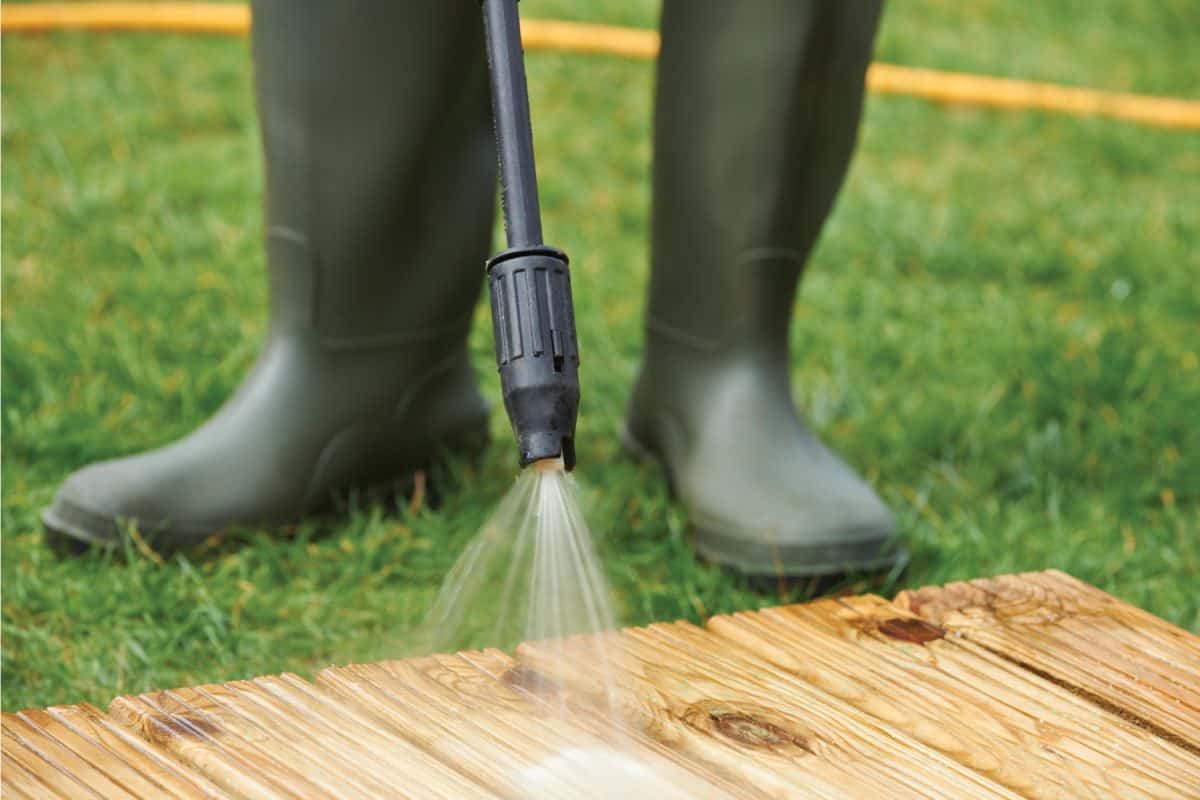
Can You Pressure Wash Artificial Grass?
For artificial grass that doesn't have infill, pressure washing is a relatively popular cleaning method. As long as you use a wide-angle tip and keep the wand at least one foot away from the surface in this situation, there shouldn't be any problems.
To prevent spraying directly toward the ground, it is best to keep the angle of the spray constant. Additionally, by carrying out this action, your lawn will simultaneously be cleaned and fluffed.
Can You Use Vacuum Cleaner On Artificial Grass?
Infill, which is a crucial component of your lawn and what gives it that soft, bouncy feel comparable to natural grass, might be sucked up by the vacuum. The second issue is the potential for a strong vacuum's suction to loosen synthetic turf, especially if it is used frequently over time.
This could result in shifting or sagging, which would require repair. You can vacuum artificial grass, but it is probably best to explore alternative possibilities first.
Vacuuming your grass regularly and adhering to a care regimen that doesn't remove the infill or loosen the installation are advised.
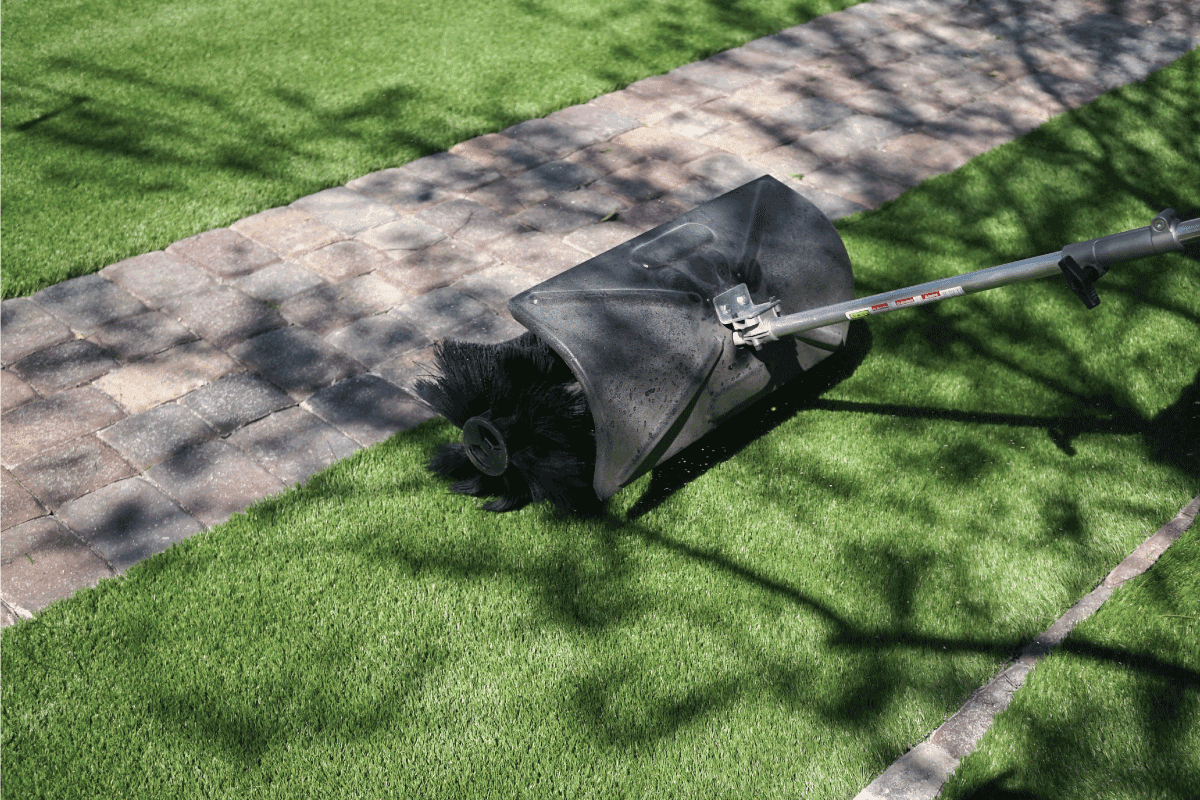
To Sum Up
Artificial grass is very economical if preserved and maintained well. To keep this low maintenance lawn looking fine, avoid placing heavy objects on top, clean spills quickly, and don't wash using harsh chemical cleaners.




![A man using a portable vacuum to collect dead leaves, Will A Leaf Vacuum Pick Up Mulch? [Can It Remove Leaves From Mulch?]](https://landscapingbase.com/wp-content/uploads/2022/09/Man-using-a-portable-vacuum-to-collect-dead-leaves-600x400.jpg)
